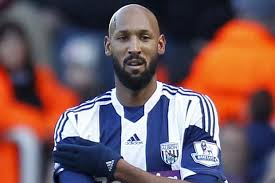By Andrew Warshaw
January 2 – The ‘quennelle’ Nazi sign made by former French international striker Nicolas Anelka has prompted fierce reaction in both sporting and political circles that is showing no sign of abating – even though the player has promised not to repeat it.
Anelka performed the gesture – an inverted Nazi salute – after scoring during last weekend’s 3-3 Premier League draw at West Ham, drawing widespread condemnation including from French Sports Minister Valerie Fourneyron.
The much-travelled Anelka, who has often courted controversy, strongly defended himself, saying he is anything but an anti-Semite and that he was simply paying tribute to the French comedian Dieudonné M’bala M’bala, one of his friends. Dieudonné is a controversial figure in France because of his far-right views and brought the gesture, known in France as a quenelle, to prominence.
Anelka has pledged not to repeat the action, which shows the left hand held across the shoulder of the right arm pointing downwards. A statement from his club said it had asked Anelka to refrain from performing it and that “Nicolas immediately agreed to adhere to this request.”
“Nicolas said that he performed the gesture to dedicate his goal to a friend and vehemently denied having any intention to cause offence,” West Brom added.
Piara Powar, executive director of Football Against Racism in Europe (FARE), says Anelka’s actions have highlighted the growing influence of far-right groups in football.
“The rise of the far right is one of the most dangerous phenomena facing Europe right now,” said Powar. “Whether these are groups of anti-Semites like Dieudonne M’Bala M’Bala, Islamophobic groups like the EDL (English Defence League) or the more usual white power street skinheads, they are active and alive in football. In that context alone it was disappointing to see someone like Anelka make the quenelle gesture.”
Powar, however, does not feel Anelka’s gesture was as serious as the unrelated 2012 incidents involving Liverpool’s Luis Suarez and Chelsea’s John Terry who were banned for eight and four matches respectively. “The gesture made by Anelka is damaging but in my view it is not the same as the abuse meted out by Luis Suarez and John Terry,” he said.
Montpellier defender Mathieu Deplagne, Manchester City’s Samir Nasri, Liverpool’s Mamadou Sakho and NBA basketball star Tony Parker have all been pictured making the same salute as Anelka but all deny any anti-Semitic intentions.
But Powar warned: “The fact that the players may have been conned into mimicking something in support of a friend makes it no less a dangerous gesture.”
“There is a wider and important context of the rise of someone like Dieudonne M’Bala M’Bala. French race politics and the way in which race plays an increasing part of life in France, are becoming distorted and murky. Many believe that the French integrationist approach to racial diversity is failing. No doubt part of the appeal of something like the quenelle is that it has also come to be seen as anti- establishment.”
Arsenal manager Arsene Wenger, who first brought Anelka to English football, believes only the player himself can say whether he knew the full implications of his celebration.
“Nobody knows in France what it means,” Wenger said. “Some make it an anti-system movement, some make it an anti-Semitic movement. I think personally I don’t know, I have never seen this movement.”
Contact the writer of this story at moc.l1734835965labto1734835965ofdlr1734835965owedi1734835965sni@w1734835965ahsra1734835965w.wer1734835965dna1734835965

